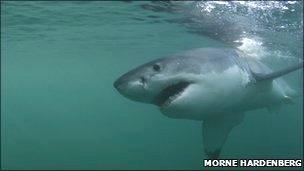Great white sharks in Mediterranean made 'wrong turn'
- Published

Great whites can migrate for thousands of kilometres each year
Great white sharks in the Mediterranean may have first arrived from the seas around Australia about 450,000 years ago, genetic studies have suggested.
Researchers writing in Proceedings of the Royal Society B, external believe the arrival may have been simply a migratory "wrong turn" by a few pregnant females.
A tumultuous climate between ice ages may have been the cause.
The species - Carcharodon carcharias - would have remained in the Med because it returns to spawn where it was born.
It was previously assumed that the great whites in the Mediterranean were most closely related to their nearby cousins in the Atlantic Ocean.
But now, a team led by Les Noble of the University of Aberdeen has examined the several groups of sharks' mitochondrial DNA - genetic material passed through the maternal line that is particularly suited to tracing lineages.
The team found that the Mediterranean sharks were very different to the Atlantic group and more like sharks from Australia and New Zealand.
Although changes to the DNA in the different populations happen randomly, they do happen with a regular average rate.
As a result, the few differences between the Australian and Mediterranean sharks are an indication of how long ago they parted ways: 450,000 years ago - a time between ice ages that would have seen many effects of a changing climate.
"That was a time of interglacials, when you would've had all kinds of changes in the currents going down the east and up the western coast of Africa," Dr Noble told BBC News.
The team hypothesises that strong, warm currents pushing the sharks northward would have put them far off course.
"They might have gone a considerable way up there before the warmth ran out. Then they start trying to turn east and north and the first place you can go east, of course, is the Straits of Gibraltar.
"It's not too much of a stretch to imagine the odd one might indeed do a 'wrong turn' and make this kind of migration."
'Think big'
It may have been rare for sharks to fall prey to the currents, but Dr Noble explained that perhaps only a few pregnant great whites would have needed to make the journey.
"The reason we still have a genetic signature of that with the great whites is because they're like salmon - where the pups are dropped, they recognise as their home - that's where they always return to."
It may be then that just a few shark pups - or perhaps just one - born in the Mediterranean due to a migratory wrong turn, returned to establish the species there.
Ken Collins of the National Oceanography Centre called the study "seriously fascinating".
He explained that glaciation periods have been invoked in the past to explain the migration of species between the Pacific and the Atlantic, at a time when the Earth's poles were ice-free.
"We need genetic studies with other species to explain these global migrations," he told BBC News.
"You've got to think big to come up with a rational explanation; the logic (of this study) is faultless."